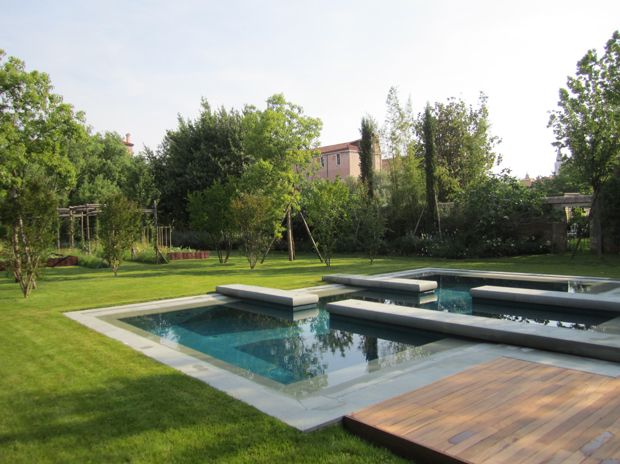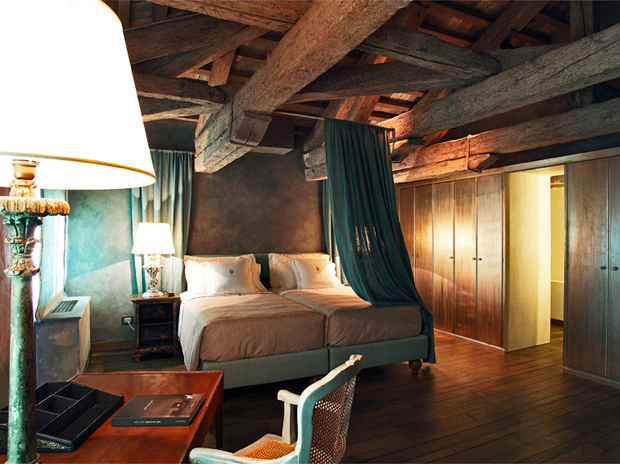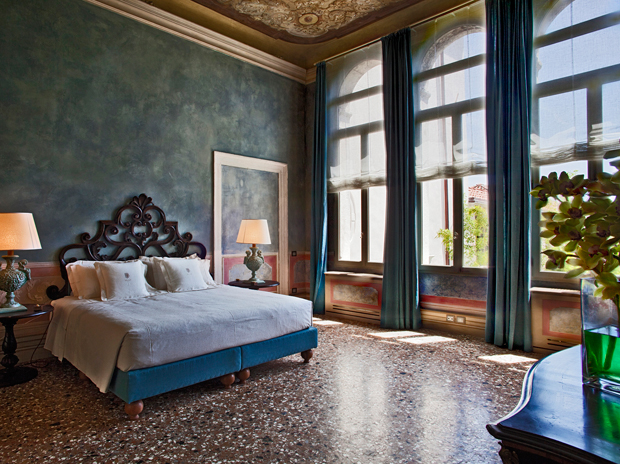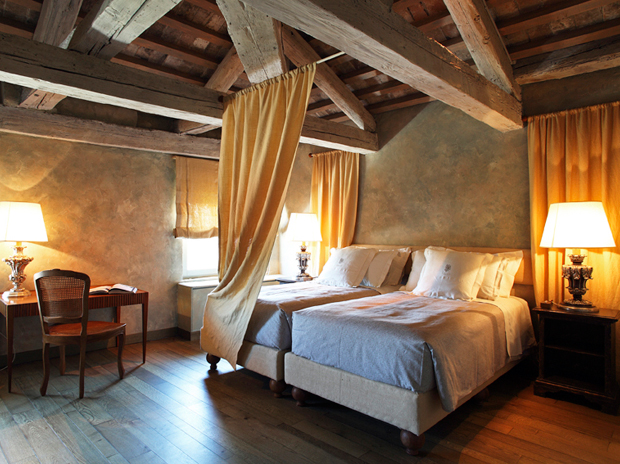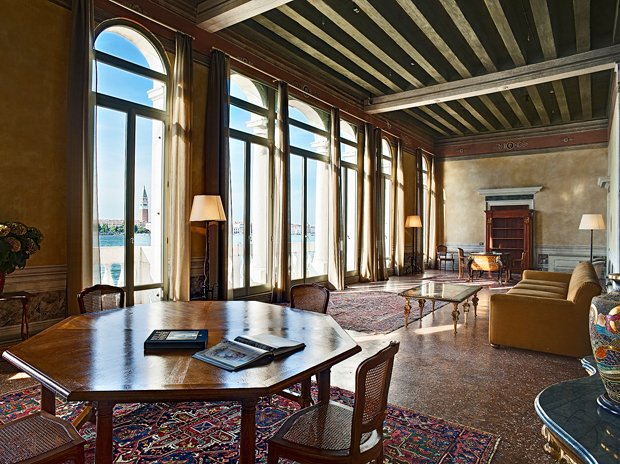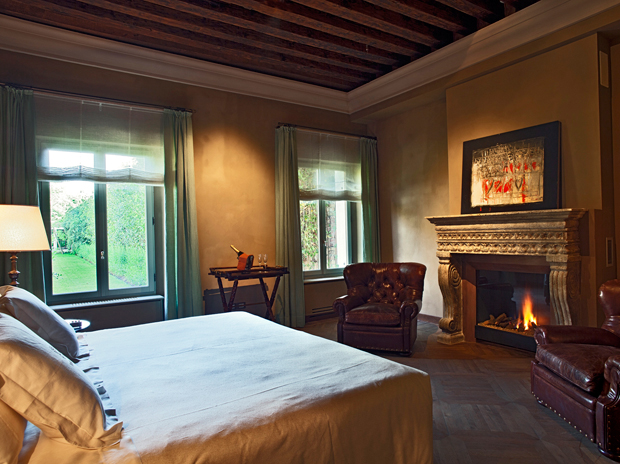"It is the city of mirrors, the city of mirages, at once solid and liquid, at once air and stone."
- Erica Jong
Romance is that most deliciously human of contradictions - that fleeting glimpse of those eternities that stretch out within a moment. Venice is that most romantic of cities - having stood for centuries as an intricate testament to our need to sustain the impossible with our capacity to create beauty.
There are a thousand love stories blossoming and exploding on Venice’s one hundred and seventeen islands and languidly cruising along its gloriously obscured and entwined liquid pathways. The canals are the anima of this island that is not an island, neither land nor sea, neither flesh nor blood, the arteries and ventricles of this Italian heart that beats to the timeless lovers’ rhythm of flight into love to escape death.
The cheating of our inevitable demise through the genius of creation is a Venetian motif found throughout this extraordinary archipelago on the Northern coast of Italy, as she sinks slowly into the seabed, its denizens’ ingenuity constantly just keeping her skirts from getting wet.
This labyrinth of tidal streets and island citadels crowded with ever more elaborate and beautiful buildings was considered in Europe as one of the gateways to the East. Being perhaps the last European transit point in the ever-expanding eastern trade route and therefore blessed with an extraordinary cultural commingling, the city proudly flourished its unique identity, with its Venetian Gothic architecture (Gothic with Byzantine and Arab influences) jealously guarded and envied across the world.
From just one of a million Venetian love stories comes a journey that can be charted from the spark of romance, to the veneration of legacy, to the rekindling of a love affair from its smouldering embers.
In the mid nineteenth century, ambitious young Austrian Julius Grünwald fell almost instantly in love with both Venice and one of her maidens, whose father was director of the renowned Hotel de la Ville. By 1880, the young couple, together with her father, had opened the Bauer-Grünwald, which took their names and laid the foundations for the Bauer hotel name that has in nearly a century and a half become a synonym for classic Venetian hospitality.
The dynasty was grinding to a natural halt following Grünwald’s death, when the Bauer, as it had become known, was taken on in 1930 by Italian merchant Arnaldo Bennati, whose daring vision was to take the counter-intuitive step of closing the successful hotel for nearly a decade. Bennati’s painstaking restoration rebuilt the original Eighteenth Century façade in a note perfect homage to the signature Venetian Gothic style that has made Venice the architectural envy of the world since the fourteenth century. He also premiered Settimo Cielo, which, at a height of seven storeys, is still the city’s highest outdoor terrace.
That Bauer remains one of the premier hospitality locations in one of the most prestigious metropolitan destinations in the world is thanks in large part to the fact that one hundred and thirty years later, it remains a familial concern. Run since 1997 by Francesca Bortolotto Possati, Bennati’s granddaughter, the company has been transformed into BAUERs - a modern, diversified and ever more sophisticated hospitality brand at the vanguard of the luxury Venetian market.
Bortolotto has overseen a second radical refit of The Bauer, which now comprises two distinct and yet complementary hospitality concepts - The BAUERs L’HOTEL, a five-star cutting edge reimagining of art-deco luxury styling and, Il PALAZZO, a boutique fantasy that takes the building’s origins as an authentic eighteenth century residence as the base note of every facet of the guests’ experience.
Already boasting stellar new additions Bauer Casa Nova and BAUER Palladio Hotel & Spa, both exquisitely rendered restorations of important pieces of classic Venetian architecture, the company moved last February in a stunning new direction with the opening of Villa F, on the island of Giudecca.
Bortolotto has taken a wild and euphoric plunge into a particularly redolent period of Venetian history, having rescued from dereliction this sixteenth century noble residence, itself an icon of one of the city’s golden creative ages.
This grand building had, by the early twentieth century, been converted into Pensione Frollo, a high class pensione, or boarding house, and became a vibrant haunt of the dazzlingly influential coterie of artists, writers and actors that flocked to the fertile Venetian dreamscape for inspiration. During this wildly creative time, this community, including such luminaries as Gabriele D’Annunzio, Eleonora Duse and Mabel Holland, transformed Giudecca into a thriving and ultra fashionable bohemian enclave.
With its eleven independent residential suites and three acres private garden, the largest and most beautiful in the city, Villa F is the only luxury residential complex with hotel service of its kind. Each historical facet has been lovingly restored, playfully and delicately using the vocabulary of eclectic modern design and the finest materials - both modern and antique. Here the pictures painted by the breathtaking views are more reminiscent of a rare masterpiece than a postcard, with the many suites providing new and arresting aspects on some of the city’s most famous vistas, such as San Marco and Chiesa della Salute. A familiar prize viewed with new eyes is all the more valuable.
In a fascinating knight’s move, Bortolotto mines the rich sense of living history that breathes through each epic room and sits on each ancient roof beam. Her Villa F is a truly unique invitation to walk in the echoes of the illustrious former inhabitants, to live as a Venetian of noble tastes or an artist engulfed in Venetian creative rapture, rather than the parade through the picture postcard fantasy that the millions of regular tourists experience here each year.
At Villa F the contradictions of Venice - romance, life in the crux of the eternal contest between water and land, the fact of beauty being its own undoing - become riddles that remain luxuriously unsolved.
- Benjamin Stewart
Villa F
Address: Giudecca 37
Venice, 30133
Tel: 04 15 20 70 22
Website: www.villafvenezia.com
- Erica Jong
Romance is that most deliciously human of contradictions - that fleeting glimpse of those eternities that stretch out within a moment. Venice is that most romantic of cities - having stood for centuries as an intricate testament to our need to sustain the impossible with our capacity to create beauty.
There are a thousand love stories blossoming and exploding on Venice’s one hundred and seventeen islands and languidly cruising along its gloriously obscured and entwined liquid pathways. The canals are the anima of this island that is not an island, neither land nor sea, neither flesh nor blood, the arteries and ventricles of this Italian heart that beats to the timeless lovers’ rhythm of flight into love to escape death.
The cheating of our inevitable demise through the genius of creation is a Venetian motif found throughout this extraordinary archipelago on the Northern coast of Italy, as she sinks slowly into the seabed, its denizens’ ingenuity constantly just keeping her skirts from getting wet.
This labyrinth of tidal streets and island citadels crowded with ever more elaborate and beautiful buildings was considered in Europe as one of the gateways to the East. Being perhaps the last European transit point in the ever-expanding eastern trade route and therefore blessed with an extraordinary cultural commingling, the city proudly flourished its unique identity, with its Venetian Gothic architecture (Gothic with Byzantine and Arab influences) jealously guarded and envied across the world.
From just one of a million Venetian love stories comes a journey that can be charted from the spark of romance, to the veneration of legacy, to the rekindling of a love affair from its smouldering embers.
In the mid nineteenth century, ambitious young Austrian Julius Grünwald fell almost instantly in love with both Venice and one of her maidens, whose father was director of the renowned Hotel de la Ville. By 1880, the young couple, together with her father, had opened the Bauer-Grünwald, which took their names and laid the foundations for the Bauer hotel name that has in nearly a century and a half become a synonym for classic Venetian hospitality.
The dynasty was grinding to a natural halt following Grünwald’s death, when the Bauer, as it had become known, was taken on in 1930 by Italian merchant Arnaldo Bennati, whose daring vision was to take the counter-intuitive step of closing the successful hotel for nearly a decade. Bennati’s painstaking restoration rebuilt the original Eighteenth Century façade in a note perfect homage to the signature Venetian Gothic style that has made Venice the architectural envy of the world since the fourteenth century. He also premiered Settimo Cielo, which, at a height of seven storeys, is still the city’s highest outdoor terrace.
That Bauer remains one of the premier hospitality locations in one of the most prestigious metropolitan destinations in the world is thanks in large part to the fact that one hundred and thirty years later, it remains a familial concern. Run since 1997 by Francesca Bortolotto Possati, Bennati’s granddaughter, the company has been transformed into BAUERs - a modern, diversified and ever more sophisticated hospitality brand at the vanguard of the luxury Venetian market.
Bortolotto has overseen a second radical refit of The Bauer, which now comprises two distinct and yet complementary hospitality concepts - The BAUERs L’HOTEL, a five-star cutting edge reimagining of art-deco luxury styling and, Il PALAZZO, a boutique fantasy that takes the building’s origins as an authentic eighteenth century residence as the base note of every facet of the guests’ experience.
Already boasting stellar new additions Bauer Casa Nova and BAUER Palladio Hotel & Spa, both exquisitely rendered restorations of important pieces of classic Venetian architecture, the company moved last February in a stunning new direction with the opening of Villa F, on the island of Giudecca.
Bortolotto has taken a wild and euphoric plunge into a particularly redolent period of Venetian history, having rescued from dereliction this sixteenth century noble residence, itself an icon of one of the city’s golden creative ages.
This grand building had, by the early twentieth century, been converted into Pensione Frollo, a high class pensione, or boarding house, and became a vibrant haunt of the dazzlingly influential coterie of artists, writers and actors that flocked to the fertile Venetian dreamscape for inspiration. During this wildly creative time, this community, including such luminaries as Gabriele D’Annunzio, Eleonora Duse and Mabel Holland, transformed Giudecca into a thriving and ultra fashionable bohemian enclave.
With its eleven independent residential suites and three acres private garden, the largest and most beautiful in the city, Villa F is the only luxury residential complex with hotel service of its kind. Each historical facet has been lovingly restored, playfully and delicately using the vocabulary of eclectic modern design and the finest materials - both modern and antique. Here the pictures painted by the breathtaking views are more reminiscent of a rare masterpiece than a postcard, with the many suites providing new and arresting aspects on some of the city’s most famous vistas, such as San Marco and Chiesa della Salute. A familiar prize viewed with new eyes is all the more valuable.
In a fascinating knight’s move, Bortolotto mines the rich sense of living history that breathes through each epic room and sits on each ancient roof beam. Her Villa F is a truly unique invitation to walk in the echoes of the illustrious former inhabitants, to live as a Venetian of noble tastes or an artist engulfed in Venetian creative rapture, rather than the parade through the picture postcard fantasy that the millions of regular tourists experience here each year.
At Villa F the contradictions of Venice - romance, life in the crux of the eternal contest between water and land, the fact of beauty being its own undoing - become riddles that remain luxuriously unsolved.
- Benjamin Stewart
Villa F
Address: Giudecca 37
Venice, 30133
Tel: 04 15 20 70 22
Website: www.villafvenezia.com

Villa F




